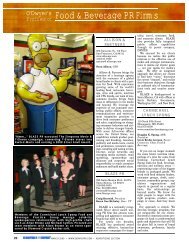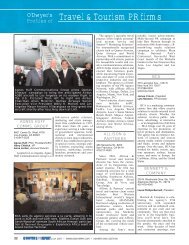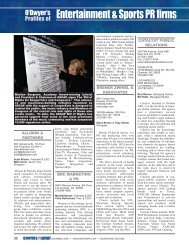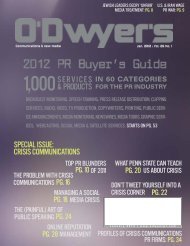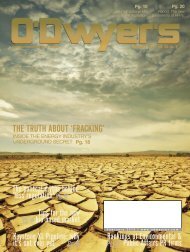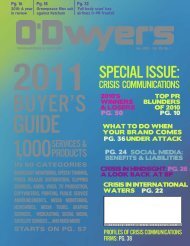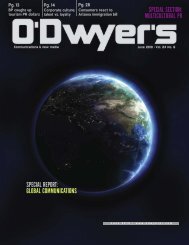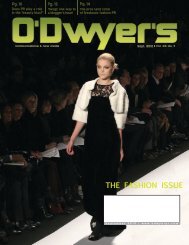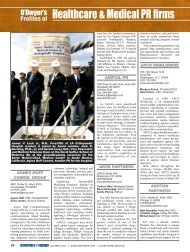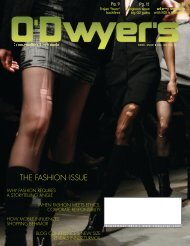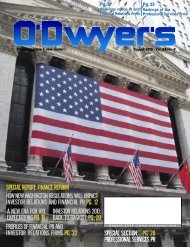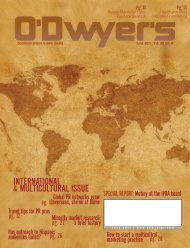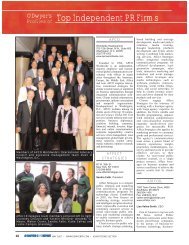PR Firm Rankings - Odwyerpr.com
PR Firm Rankings - Odwyerpr.com
PR Firm Rankings - Odwyerpr.com
You also want an ePaper? Increase the reach of your titles
YUMPU automatically turns print PDFs into web optimized ePapers that Google loves.
MEDIA NOTES<br />
Police, court deny journalist protection for bloggers<br />
By Jon Gingerich<br />
Aseries of recent legal and criminal<br />
inquiries have stoked the debate as<br />
to whether bloggers should be treated<br />
as equal to print, TV or online journalists.<br />
In one case, authorities revoked a blogger’s<br />
rights to newsgathering materials, an<br />
act experts claim is illegal under the<br />
Privacy Protection Act. In another separate<br />
case, courts ruled that bloggers are not protected<br />
by the same shield laws that immunize<br />
journalists from divulging their confidential<br />
sources.<br />
Police in April raided the Fremont, CA<br />
home of Gizmodo Editor Jason Chen, seizing<br />
personal <strong>com</strong>puters as well as hard<br />
drives and a digital camera. Chen had<br />
weeks previously landed a scoop in the blogosphere<br />
when he published an exposé<br />
detailing the prototype of a new, yet-to-bereleased<br />
model of Apple’s iPhone, <strong>com</strong>plete<br />
with photos.<br />
The story came under dubious circumstances.<br />
Chen allegedly obtained the phone<br />
U.S. newspapers<br />
continue decline<br />
U.S. weekday newspaper circulation<br />
fell by nearly 9% between<br />
Oct.’09 and March ’10, with<br />
Sunday editions falling 6.5%, according<br />
to data released in April by the Audit<br />
Bureau of Circulations.<br />
The figures are actually a slight<br />
improvement from newspaper losses at<br />
this time last year, when weekday newspaper<br />
circulation dropped 10.6% from<br />
the year before and Sunday circulation<br />
fell 7.5%.<br />
Several top U.S. daily publications<br />
have continued experiencing serious circulation<br />
losses within the past year, with<br />
notable examples including the San<br />
Francisco Chronicle, which lost nearly<br />
23% of its subscribers, USA Today,<br />
which lost 13.6% of its readers and the<br />
Washington Post, which lost 13%.<br />
The New York Times fared slightly<br />
better, experiencing an 8.5% decline in<br />
weekday subscribers and a 5.2% decline<br />
in Sunday editions.<br />
According to an AP report on the<br />
ABC findings, these numbers now give<br />
the Wall Street Journal the largest circulation<br />
of any newspaper in the United<br />
States. <br />
by paying an undisclosed third party<br />
$5,000. The seller, whom Chen has so far<br />
refused to identify, claims the phone was<br />
found at a bar in nearby Redwood City.<br />
The story was enough to catch the ire of<br />
Apple, a <strong>com</strong>pany that enacts notoriously<br />
iron-fisted research and development policies.<br />
The <strong>com</strong>pany’s lawyers contacted<br />
Gizmodo, and the blog eventually returned<br />
the iPhone. Gizmodo claims it had previously<br />
tried to give the phone back to Apple<br />
but received no response.<br />
Chen has not been arrested for any crime.<br />
Lucy Dalglish, Executive Director for The<br />
Reporters Committee for Freedom of the<br />
Press, said that if police were not investigating<br />
Chen for breaking the law, their search<br />
warrant is illegal and they didn’t have the<br />
right to confiscate his personal property.<br />
Specifically, the property seizure was a<br />
violation of the Privacy Protection Act of<br />
1980, which protects news gatherers from<br />
being searched and having the materials<br />
they use to present a story (in this case, an<br />
iPhone) confiscated.<br />
“This was a screw up and they’re getting<br />
very defensive about it. Congress passed a<br />
law 30 years ago to protect journalists<br />
against these circumstances, and thankfully<br />
(Chen) has a very good lawyer,” she said.<br />
“Search warrants are not used for civil procedural<br />
matters, they’re used for criminal<br />
matters. There’s no First Amendment right<br />
not to be searched. In a situation like this<br />
there’s a Federal law that says if you want<br />
news gathering materials, you need to supply<br />
a subpoena.”<br />
In a letter to authorities, Gawker Chief<br />
Operating Officer Gaby Darbyshire reiterated<br />
the claim, stating that under both “state<br />
and Federal law, a search warrant may not<br />
be validly issued to confiscate the property<br />
of a journalist.” She referred to Chen as “a<br />
journalist who works full time for our <strong>com</strong>pany.”<br />
Gizmodo is owned by Gawker Media.<br />
Dalglish said the only time the Privacy<br />
Protection Act does not protect journalists<br />
against search and seizure is under “very<br />
narrow circumstances” where a journalist is<br />
considered the perpetrator in a criminal act.<br />
If authorities believe Chen <strong>com</strong>mitted a<br />
criminal act in the course of acquiring the<br />
phone, experts have speculated that Chen’s<br />
profession as a journalist may not be called<br />
into question as much as whether he knowingly<br />
received stolen property, in which<br />
case its use would be rendered immaterial.<br />
This could prove to be a pointless debate<br />
however, as the warrant used to search<br />
Chen’s home did not reveal him as a suspect<br />
in a criminal act.<br />
“The only way you could get a search<br />
warrant is if it’s criminal, so clearly they<br />
believed a felony has been <strong>com</strong>mitted,<br />
though it’s unclear what the charge is,” said<br />
Matt Zimmerman, Senior Staff Attorney at<br />
the Electronic Frontier Foundation. “The<br />
short version here is there’s a California<br />
penal code which is very broad that prohibits<br />
law enforcement from getting this<br />
information from journalists.”<br />
Shield law shuns blogger<br />
Although incorrectly stated in more than<br />
one recent news report, Chen’s ordeal currently<br />
has no applicability under current<br />
shield laws, which is legislation that effectively<br />
strips journalists of any legal obligation<br />
to reveal their sources under subpoena.<br />
Shield laws vary state-by-state (there is<br />
currently a proposed Federal law on the<br />
floor of the U.S. Senate). Under California<br />
state law, Chen may invoke this privilege if<br />
asked to reveal the identity of the individual<br />
who sold him the phone, though no case<br />
has gone to court and such scenarios have<br />
not been entertained publicly.<br />
On the other hand, a New Jersey appeals<br />
court in April ruled that bloggers can’t<br />
invoke the same confidentiality privileges<br />
as the press simply because they claim to be<br />
“journalists.”<br />
In this case, Washington State native<br />
Shelle Hale was sued for defamation by<br />
porn software provider Too Much Media<br />
when she publicly accused the <strong>com</strong>pany of<br />
fraud, among other ethical violations, on<br />
industry news blog oprano.<strong>com</strong>.<br />
Hale later claimed her statements were<br />
the result of quotes procured from <strong>com</strong>petent<br />
sources, and were divulged for the purpose<br />
of informing the public.<br />
When Too Much Media’s lawyers<br />
planned on deposing her sources, Hale<br />
moved to New Jersey in order to take<br />
advantage of the state’s existing shield<br />
laws, and set up a “news” web site to further<br />
her standing as a journalist (the site did<br />
not feature any content).<br />
In its ruling, the court stated that Hale<br />
“exhibited none of the recognized qualities<br />
or characteristics traditionally associated<br />
with the news process, nor has she demonstrated<br />
an established connection or affiliation<br />
with any news entity.”<br />
Too Much Media’s attorney Joel<br />
Kreizman went a step further:<br />
“Some people regard the Internet as the<br />
Wild West but there are some rules that<br />
apply. The shield law is limited to members<br />
of the media, not pretenders or<br />
wannabes.” <br />
8 MAY 2010 WWW.ODWYER<strong>PR</strong>.COM



